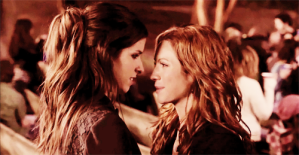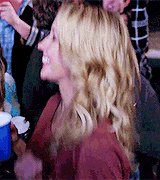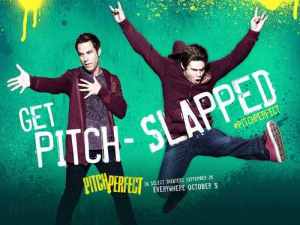The Breakfast Club in Pitch Perfect is one of Jesse Swanson’s favorite movies. As I have already pointed out in my post about Jesse’s movie collection, it is the most unconventional of his choices of films. Why? Because, although it is a classic of its time, a perfect representation of rebellious adolescence, there were few awards to confirm its status as ‘great movie.’ While it has been a favorite with misunderstood teens from its making until now – like so many other John Hughes movies – it doesn’t stand out in the great scheme of movie making history. Jesse’s other favorite movies do.
Still, as part of Pitch Perfect, this movie had been chosen to stand out during the story line to build a link between Beca Mitchell – who doesn’t like movies – and Jesse Swanson – who loves movies and especially music in movies. And once again, there is this question: why? Why The Breakfast Club?
Movies as reference in movies (or tv) is not a new concept. Popcultural references exist almost as long as movies have. Think of James Stewart singing ‘Somewhere Over the Rainbow’ in The Philadelphia Story thus referencing The Wizard of Oz, a movie that had been produced by the same studio and had come out the year before. Reference as advertisement, or reference as simple reminder of how great some movies were. But in most recent years, movies as reference have often been used to examplify a sort of kinship in plot or characterization.
Think of Easy A, the main reference is certainly The Scarlett Letter (yes, this is strictly speaking a literary reference but at least two movie versions are mentioned) but it also points toward the same movies The Breakfast Club is a part of: John Hughes’ movies about adolescents fighting to be understood – if only by their peers. And it uses the references to draw similarities, in actuality, goes as far as to copy scenes from these movies.
Pitch Perfect doesn’t do that. And this is a surprise. The similarity in plot you can find between Pitch Perfect and the movie it references is merely this: a group of very different people (some of them social outsiders) comes together. That’s all. They don’t do the same things, they don’t even exist in the same social setting, they merely come together.
Believe me when I say that from a cultural theorist’s point of view this is disappointing. I spent quite a few hours trying to come up with similiarities that simply don’t exist. Plotwise. Yes, you can point out that one scene in which the Bellas sit down together and share little stories of their lives but it falls short in comparison with the unscripted bonding scene in The Breakfast Club. The amount of time dedicated to this scene in the 80s movie, its significance for the film alone, would put a comparison with the Pitch Perfect-scene to shame. This is not a comparison worth making.
But, fortunately, there is more than plot to compare. Characters are an important part of every story worth watching or reading, they usually exist with the plot, sometimes despite the plot, and even without it (and then there are those unfortunate examples of movies without characterization, be it with or without plot).
As the ending of The Breakfast Club is the part of it Pitch Perfect dwells on (playing the ending twice, having Jesse state that the ending is the best part of any movie), and it’s the part of the movie that states the characters’ stereotypical function within the narrative, it makes sense to have a closer look at the characters:
Beca Mitchell (Anna Kendrick) is an unlikely heroine. I don’t know if this has been stressed enough or at all but the heroines of movies about coming-of-age and young adulthood are not usually tomboys wearing dark eye-liner and plaid shirts – at least they haven’t been for the last 20 years. I can only think of one other (female) character with similar markers: Mary Stuart Masterson’s Watts in Some Kind of Wonderful – another movie written by (who else?) John Hughes. The tomboy is not part of a popular narrative but if you think about it, she lends perfectly to stand as reference to a male character of the 80s. Feminist instead of casually misogynistic
John Bender (Judd Nelson) and Beca Mitchell are both discribed as rebellious, they struggle within their familial bonding, and live to do their thing. They value friendship and don’t shy away from breaking the rules to help someone out. They embody teenage ennui, are quick witted, somehow under-challenged. They repesent the smart American teenager/young adult who is not interested in being an intellectual.
This character is much more likely to be male than female. The tomboy is used as a stand-in for ‘male characteristics’ in female characters. Which is certainly an interesting theory but not one I want to elaborate here.
If we take the names of these two characters, Beca and Bender (as he is called despite his first name being John), we have another marker that connects them, a letter: B. This would not be significant if we couldn’t draw a line from the two heroes to the other characters where this is repeated. Look at it: Claire and Chloe , Andrew and Aubrey, Brian and Benji – and Allison and Amy which works better with the letters here than with the characters.
Of course, if you want to look at it this way, you cannot ignore Bender’s first name and the fact that he and Jesse (Skylar Astin) also share a letter. It would seem to me that Cannon – or whoever came up with this lettering comparison – created Beca and Jesse as two sides of John Bender. This would certainly pull them together in a platonic (from Plato’s theory of one person being smite into two by envious gods) soul-mate-y kind of way – if Jesse was indeed a part of Bender. But – and this I have already stressed in my other post about Jesse’s movie collection – there is little to nothing that connects Bender to Jesse. I see Jesse as a very conservative fellow who lacks instinct – another characteristic that Bender and Beca share. He’s not very adventurous although he would probably disagree with this assessment. What I see in him – when put in relation to The Breakfast Club within Pitch Perfect – is a meta narrator. He point us toward the movie, introduces us to the meta discourse that connects The Breakfast Club with Pitch Perfect, pretty much introduces Bender to Beca to make her see where she stands in the scheme of her own narrative. Fascinating and necessary as he is in this regard, he doesn’t seem to be part of this narrative itself. He’s more of a tool than a character in introducing The Breakfast Club (just think of how many of you watched The Breakfast Club after watching Pitch Perfect – Jesse introduced it to you).
I am not saying that Jesse Swanson isn’t a character within the Pitch Perfect narrative – he is Beca’s love interest (as by request of the powers that be), he is also her rival, her adversary, and Mr. Nice Guy of the movie – but i wasn’t able to find him as a representative to one of the characters within The Breakfast Club-reference – even though he introduced it to us. This may seem complecated but it also makes sense since it would make for bad narrating if he were to point out a movie to us in such detail in which he would see himself as the hero – much more so because he is not the hero of Pitch Perfect since that’s Beca.
While Jesse is certainly put into Pitch Perfect as Beca’s love interest, this stereotype is undermined by the referential narrative of The Breakfast Club. If Beca is Bender, then there is no doubt Chloe is Claire. Brittany Snow was asked by the makers of the movie to change her hair color to red (and please keep in mind that her red hair was a kind of signature feature of Molly Ringwald’s at the time – much as platinum was Marilyn Monroe’s [what I’m saying is that in some cases a hair color is not just a hair color]). If we keep this in mind, it is not surprising that there is a fair amount of confusion (or certainty) about Beca and Chloe’s relationship. Bender and Claire were an item – as shortlived, passionate and off-camera as it was, they were canon. Is it surprising that fans of Pitch Perfect see this in Beca and Chloe also? No, it is actually part of their referenctial narrative: they are polar opposites who more than like each other.
Chloe’s character is certainly that of a ‘princess’ – she is priviledged, her open demeanour is part of a character who knows that she can afford it because it has never been rejected. It is never said whether Chloe’s parents are rich but I at least made it part of her story line in my fanfictions – even before I bagan thinking about her as a Claire-character. She comes across as someone who doesn’t have to work hard to be liked – she is popular. Pitch Perfect‘s narrative complicates this, certainly, as Chloe is part of a world that is more nerdy than mainstream, still, she is very open and well liked (even by someone as reclusive as Beca).
If anything she is more generous and less concerned with other people’s opinion than Claire but she is also in her early twenties while Claire is still very much a teen. Also: while referential characters may have some of the original’s characteristics, they shouldn’t have them all. Mere repetition is not very flattering, and Pitch Perfect‘s characters would only have been half as interesting if they had been mere rip-offs of The Breakfast Club‘s characters.
Aubrey (Anna Camp) and Andrew (Emilio Estevez) are probably most similar. They both get a lot of pressure from their fathers, and they both ‘blow’ under pressure. While Andrew uses his strength and aggression against a weak schoolmate, Aubrey literally ‘blows’ – losing her lunch at the most important event of her aca-career, ruining her team’s chances of winning. They’re both athletic, they’re both drawing attention by their looks. Aubrey and Andrew are both complicated characters in search for control – unaware that losing control can actually help them more. They both find help in friendship but also have a hard time letting themselves fall into those friendships. I like both characters a lot, because they are so complex but not at the heart of the narrative. They are important but not the main heroes of their stories.
Considering this, I should probably note the antagonism between Aubrey/Beca and Andrew/Bender. And it’s the same kind of antagonism: a person who sees themself as leader has issues with an anti-hero figure, an alt-girl, a troublemaker. Out of this antagonism can arise sexual tension and whether we look at Pitch Perfect or The Breakfast Club, homoerotic subtext can be read into both pairings.
The nerd-factors of Benji (Ben Platt) and Brian (Anthony Michael Hall) are obvious. They are outsiders within the narrative of the outsider. It is again Jesse who introduces Benji’s otherness to the Pitch Perfect narrative, and it is no big leap to see Brian in him. While Benji is not part of the Bellas (couldn’t be) he is still part of the outsider-meme in Pitch Perfect. But his otherness is probably more problematized than any other because it is frowned upon. Otherness as part of institutionalized discrimination – racism, sexism, homophobia, etc. – may be touched upon in Pitch Perfect but as it is recognized as discrimination, there is more tolerance, more politcal correct liberalism afforded to it than toward mere nerd-dom which is labelled as plain ‘weirdness.’ This is probably not surprising, as nerds are mostly seen as straight, white, and male (which is, of course, not entirely true) – and are represented in both movies as (possibly) straight, white, and male. But there is, of course, more to either Benji or Brian than their geek-dom. Benji dreams of being part of the aca-world but is denied access because of his ‘weirdness’ and Brian can only adopt his parents’ dream of excellency because he is afraid that he will be a failure if he strays from it. While they are both very likable, they have problems making friends because few people dare to look past their ‘weirdness’.
Allison (Ally Sheedy) is probably the least defined character of The Breakfast Club. I always feel like John Hughes has taken the least care with her, making her another outsider among outsiders (just as Brian) but with even less character. But her non-definition lends itself very well to a different interpretation when it comes to her representation in Pitch Perfect because I see her represented by the Bellas as a group. The ultimate outsider, if you want, someone without friends, without links even to a real world. She says that she is a nymphomaniac (Stacie [Alexis Knapp]) but then it turns out she is more of a pathological liar (think of the fact that Fat Amy [Rebel Wilson] lied about her name, Fat Patricia), she’s a little bit goth (Lily [Hana Mae Lee]) with dark eyeliner (Beca) and the tendency to overshare (Chloe). Maybe we cannot find all of the Bellas in Allison (homosexuality and race were not necessarily topics John Hughes discussed in his movies – and that is certainly representative of mainstream 80s movie culture), but her ‘otherness’ can include all kinds of otherness the Bellas inhabit, and maybe even all the otherness of Pitch Perfect‘s aca-world.
Pitch Perfect and The Breakfast Club are very different movies, from different times with different messages and memes but there’s a reason they have been linked because they share themes and (stereo)types. The Breakfast Club may seem a little extreme to the audience of today – sexuality, teenage life, outsiders were discussed differently back then, they were different back then, maybe more open, maybe more harshly expressed… the 80s, if you haven’t lived through them, were a time of inner change, of young themes, youth cult – much like the 60s but even more liberating. While we adopt a lot of themes of the 80s today, we seem to have conventionalized some of them, erased others from our memory (whatever happened to androgynity?)… Picking up The Breakfast Club in Pitch Perfect was quite daring, I think. Referencing a movie (tv show, book), practically calls for a comparison and in most cases the newer version falls flat before the referenced material. But while Pitch Perfect may never gain the same place within today’s movie culture as The Breakfast Club inhabits within its own – due to non-sensical labels such as chick-flick, or its placement in the genre of musical – it is no less valuable. Pitch Perfect is a great movie, not because it is like The Breakfast Club but maybe because it is not.























